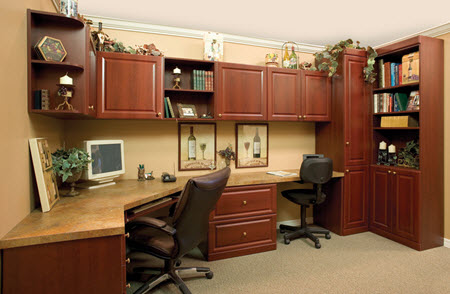Your Home office: Work More Effectively
 According to a survey conducted by Stanford University, over ten percent of all employees, based in the United States, work from their home. There are some huge benefits to working from home including, but not limited to, the time and money saved by not commuting. But, for some people, the lack of structure that comes with a traditional office setting may hinder their ability to work effectively. Below are some tips that may be helpful to keep you focused and ensure success of being productive in your home office environment.
According to a survey conducted by Stanford University, over ten percent of all employees, based in the United States, work from their home. There are some huge benefits to working from home including, but not limited to, the time and money saved by not commuting. But, for some people, the lack of structure that comes with a traditional office setting may hinder their ability to work effectively. Below are some tips that may be helpful to keep you focused and ensure success of being productive in your home office environment.
Tip #1 – Have “working hours”
Working when you want is a great benefit to working from home because the 9 to 5 window may not be the best time slot for everyone. For example, some people are naturally more productive after 5 pm or before the 9 am hour. The advantage of a home based office is that you can pick the most productive times to work; the trick is that whatever time window you choose – stick to it and make that your work day.
Tip #2 – Dress for Success
A suit and tie or high heel shoes are not required for a home based office environment, but you should get out of your sleep/lounge wear to help you focus and differentiate work time from home life. This will also increase your productivity, ensuring that you have a successful day at the office.
Tip #3 – Schedule Breaks
Breaks are important, especially if you are in front of a computer for hours on end. Every couple of hours, physically get up, stretch your body and give your eyes a much needed rest from the computer screen. Walking away from your work area will help clear your head so that when you sit back down, you are better focused. You may also find that a break can help you find a clear solution to a looming problem that you have been struggling with, or it can release you from a writing or design block.
Tip #4 – Set boundaries
Once you have set your working hours and your break times, tell your family and friends. Stress the importance that interruptions during your scheduled working hours should be kept to emergencies only (and “what is for dinner?” or “where are my sneakers” are not considered emergencies). These boundaries are important because family members may believe that just because you are physically in the home that you are available to meet their needs.
Tip #5 – create a “To do List”
This is especially helpful for individuals who struggle with procrastination and are easily distracted as it will outline exactly what needs to get done in a particular time frame. If necessary, break this list down by one hour slots.
Tip # 6 – reduce clutter
Keep your desk and overall work space clean and organized because messes are distracting. If this not incentive enough, consider the fact that your desk has a tendency to be a germ magnet and can accumulate over 400 times more bacteria than a household toilet.
Tip #7 – Leave at the end of the day
As mentioned above, it is important to set working hours and stick to that schedule and that includes leaving the office on time. Working from home does not mean that you are to work whenever you are home. The trickiest part of having a home office is to find the delicate balance between work and home life. At the end of your day, “check out” by putting your computer away and engaging in family activities or getting out of the house.
